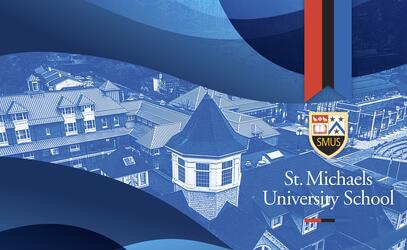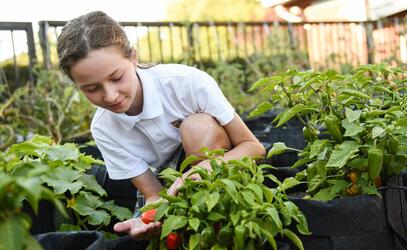
Earlier in October, Grade 2 students embarked on an exciting trip to Sea Cider Farm & Ciderhouse, a local cidery nestled on the Saanich Peninsula. The visit aligned with the class's study of matter which features an apple science unit. Teachers Michelle Janke and Lynn Porteous strategically planned the field trip to help students see, feel and taste the different states of matter, while discovering the process of apple cider production firsthand.
The field trip offered students an immersive experience to explore nature, engage their senses and deepen their understanding of science—all while surrounded by the sights, smells and tastes of over 1,300 heirloom apple trees. With the farm’s focus on sustainability and community, it beautifully complements our school’s programs, offering the perfect setting for experiential learning.
Bringing Science to Life
At Sea Cider, the students were taken on a journey through the world of apples, from tree to juice, all while observing and discussing the concepts of solids, liquids and gases.
“By observing the cider-making process, students were able to experience firsthand how matter changes," said Ms. Janke. "Watching apples transform from solid fruit into liquid juice was a powerful way for them to grasp the concept of liquids and engage all their senses.”
The experience doesn’t stop there. As part of a later lesson on gases, students will discuss the fermentation process, where cider begins to bubble—a sign of gas being produced during chemical reactions. This follow-up lesson will help cement their understanding of how matter can change states.
Learning Through the Senses
One of the key goals of the trip was to encourage the students to use all their senses to enhance their learning. The teachers emphasized that using sight, sound, smell, taste and touch, in an outdoor setting, can help students become “descriptive scientists” in their writing.
“Our goal is for students to use their senses to create vivid, sensory-rich descriptions,” Ms. Janke explained. “Seeing the apple trees, feeling the texture of apples, smelling the fresh cider and tasting different varieties of apple juice, allowed students to connect more deeply with the subject matter. In Grade 2, we always remind them that ‘great writers use their senses,’ and this trip reinforced that.”

Connecting to Nature and the Community
This excursion wasn’t just about science—it was also an opportunity for the students to connect with their environment. They picked apples, tasted freshly made juice, and learned about the time and care it takes to grow food. For many, this hands-on experience made the process of farming and food production more relatable.
“Field trips like this are essential in helping students understand where their food comes from,” said Ms. Janke. “Being able to pick apples themselves and ask questions directly to the cider maker helps them appreciate the work behind what they eat. It also fosters a connection to their local community.”
A Foundation for Future Learning
The field trip to Sea Cider also sets the stage for future lessons in the Spring, when students will explore the life cycles of flowers, butterflies and baby chicks. The knowledge they gained from observing apple trees will provide a foundation for comparing other life cycles, with hands-on activities like watching flower seeds grow serving as a bridge between concepts.
“Our hope is that by building on what they learned at Sea Cider, students will retain key skills, such as observation and using descriptive language,” Ms. Janke shared. “These are essential not only for their science studies but for their overall development as learners.”
This memorable trip to Sea Cider was more than just a fun day out—it was an opportunity to make science come alive. By engaging with the environment, using their senses, and making connections to the curriculum, the Grade 2 students returned to the classroom with a deeper understanding of the world around them. The teachers are excited to build on this experience as the students continue their studies throughout the year, learning not just about apples and cider, but about life itself.



